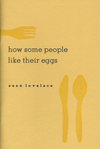How Some People Like Their Eggs
How Some People Like Their Eggs by Sean Lovelace is the recipient of the Rose Metal Press Third Annual Short Short Chapbook Contest. A collection of 10 works of very short fiction, Lovelace’s book is as much about movement as it is about structural deception.
How Some People Like Their Eggs by Sean Lovelace is the recipient of the Rose Metal Press Third Annual Short Short Chapbook Contest. A collection of 10 works of very short fiction, Lovelace’s book is as much about movement as it is about structural deception.
The opening title, “Meteorite,” begins with a recollected story, a historical event in which a woman is hit by a meteorite. The narrative veers nimbly away from this initial thread, into another story entirely, so that the reader is immersed in its world. Said reader may begin to suspect some strange literary subterfuge at work when Lovelace pulls this sleight of hand a few more times in the same story. Food is described at length, and then none is ordered. And then it is. Sentences like “I think of Paige and me drifting off somewhere in glass elevators but the image doesn’t catch and two sorority girls stroll by looking absolutely themselves” wrap this stealthy movement in delicate dressings, and eventually bring the powerful little story to an ending the author makes resonate with the effects of presence, absence, and the permanent sense of change that it brings.
Something similar happens in “Molasses”; the beginning leads the reader to believe the story is “about” a certain thing, but moves into another scenario entirely. There are advantages and disadvantages to this sort of post-structuralist sensibility. Each story seems to fly in the face of the notion that a narrative has to be “about” anything in particular; rather, Lovelace weaves scenes that flow organically (or maybe “morph” is a better word) into the next thing happening by the writerly imagination. One downside is that sometimes, the initial thread is abandoned entirely, as with “Molasses”; however, the opening narrative thread in “Meteorite” is redeemed because it is provided by way of an establishing metaphor. The author is very adept at creating a sense of place, character, and atmosphere, and the form he chooses enhances these attributes.
The sentences that Sherrie Flick refers to in the introduction as “unravel[ing] like a red carpet of words” seem to shine their brightest in “Charlie Brown’s Diary: Excerpts.” Six diary entries comprise a loose sketch of Charlie Brown, or what he would be like, were he human. An entry dated “Tuesday, March 14, 1984” reads in part:
All these medications. Spaceship names. Shapes and colors. They want to lift me and soar away. This same musty shirt, 34 years. One dog bowl. One stubby pencil. Drawn. Drawn is my word.
There is both humor and sadness in Lovelace’s language (and post-structuralist approach, even if it is not intended as such), which sometimes takes the form of imagined conversations written out as interviews, and sometimes appears as invented commentary from cultural and historical figures, as in the title story.
“How Some People Like Their Eggs” is a veritable Our Town of quirky preferences. Including the seasoned tastes of such figures as Howard Hughes, Anne Sexton, Che Guevara, and (most notably) Andy Warhol, it is here that Lovelace allows his imagination to take a frivolous romp. It is in such places that Lovelace’s talent shines, and simultaneously, where any sense of narrative in the traditional sense falls away.
Lovelace’s narrators are almost always self-aware, even if only in the most intangible of senses. His fiction is informed, and funny, and poignant, and does not take itself too seriously. It is well-crafted, with careful attention to language (especially in “Crow Hunting”) and detail and form, whatever form it shapes up to be.





